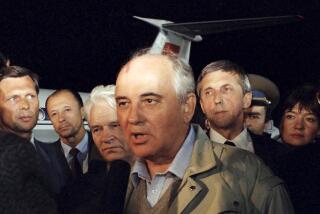Cold War Record Is Riddled with Rewrites
- Share via
Unlike the 11th hour of the 11th day of the 11th month or V-E Day or V-J Day, the end of the Cold War has no date. Even with all its witnesses, no one is sure exactly when it ended. For that matter, no one could say for certain the exact date it began. So the Cold War ended in the same fuzzy way in which it started.
Maybe it was July 6, 1990, when NATO announced that the Soviet Union was no longer an adversary. Maybe it was one of those days in late August 1990, when one republic of the U.S.S.R. after another declared independence. Maybe it was March 31, 1991, when the Warsaw Pact military alliance disbanded. Maybe it was Dec. 18, 1991, when the Commonwealth of Independent States was inaugurated. Maybe it was Dec. 26, 1991, when the U.S.S.R. was formally dissolved.
However, because of the drama in the destruction of the symbol of the Soviet empire, the date that has become recognized is Nov. 9, 1989, when the Berlin Wall crumbled.
Since that event 10 years ago, there has been an absence of public dialogue regarding the role of U.S. liberals and conservatives during the post-Khrushchev period. That absence of dialogue has left young people with the mistaken belief that the United States was united in its quest to end the expansion of the Soviet system.
It’s a lie.
It was the conservatives who wanted to build U.S. military forces to a position so strong that the Soviet Union would go broke trying to keep up. Opposing those efforts were Leonid Brezhnev, Yuri V. Andropov, Konstantin U. Chernenko and the leadership of the liberals in the U.S.
It was the conservatives in the U.S. who opposed a nuclear moratorium that would have guaranteed superiority of nuclear forces by the Soviet Union. Endorsing a nuclear moratorium were Brezhnev, Andropov, Chernenko and the leadership of the liberals.
It was the conservatives who wanted the neutron warhead deployed in Western Europe to deter a potential invasion by Soviet tanks. Opposing were Brezhnev, Andropov, Chernenko and the leadership of the liberals.
It was the conservatives who supported the liberation of Grenada that brought about free elections in that island-nation. Opposing the liberation were Brezhnev, Andropov, Chernenko and the leadership of the liberals.
It was the conservatives who advocated the deployment of Pershing missiles for the protection of Western Europe. Endorsing a nuclear freeze that would have prevented that were Brezhnev, Andropov, Chernenko and the leadership of the liberals.
It was the conservatives who backed a Strategic Defense Initiative to make an enemy’s intercontinental ballistic missiles worthless. Opposing such a defensive system for the United States were Brezhnev, Andropov, Chernenko and the leadership of the liberals.
It was the conservatives who accused the Soviet Union of violating arms treaties. Denying the violations were Brezhnev, Andropov, Chernenko and the leadership of the liberals.
It was the conservatives who wanted to bring down the Sandinistas of Nicaragua. Embracing Daniel Ortega and opposing the Nicaraguan resistance were Brezhnev, Andropov, Chernenko and the leadership of the liberals.
And it was a conservative president, Ronald Reagan, who accurately described the Soviet Union and its satellite states as an “evil empire.” Ridiculing Reagan were Brezhnev, Andropov, Chernenko and the leadership of the liberals.
Important chapters of the history of the Cold War have been quickly eliminated, misinforming the new generation.
Such misinformation is a common quest after battles have been won. Traveling through Europe shortly after World War II, it was difficult to find anyone who did not claim that they spent the war years as members of the underground. Some of them were telling the truth.
Many of them were lying.
During the first decade after the Berlin Wall fell, it has become common for older Americans to tell the new generation that they supported those who fought against Soviet communism. Some of them are telling the truth.
Many are lying.
The only difference in the years after the end of World War II and the years after the destruction of the Berlin Wall is that the delete key on computers has replaced the old red erasers.
More to Read
Sign up for Essential California
The most important California stories and recommendations in your inbox every morning.
You may occasionally receive promotional content from the Los Angeles Times.












